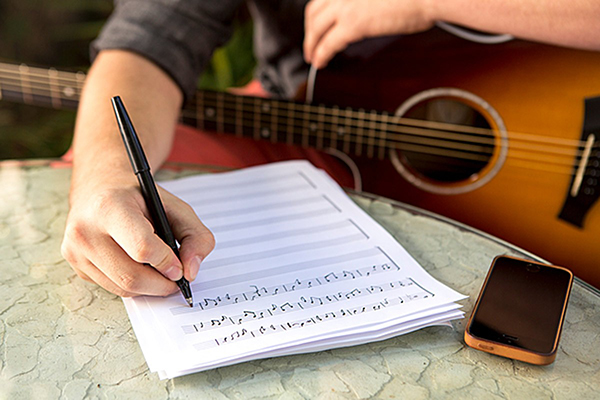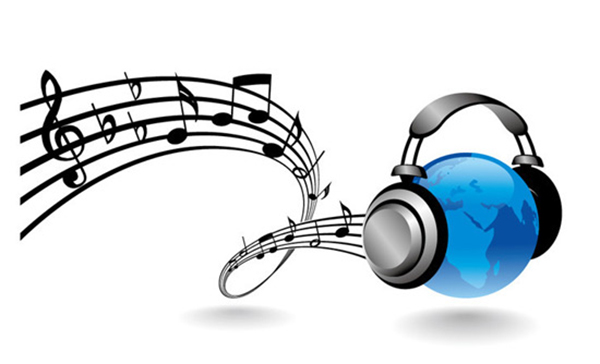Musical work is a type of work that are copied easily and used illegally. So, registering music copyright is a way to protect the legitimate rights and interests of authors and owners who creating musical works.
According to Point d, Clause 1, Article 14 of the Intellectual Property Law, musical works are one of the types of works which protected. Thus, a music copyright is a copyright to a musical work.
In addition, Article 10 of Decree No. 22/2018/ND-CP of the Government dated February 23, 2018 also defines musical works as follows: “Musical works specified at Point d, Clause 1, Article 14 of the Intellectual Property Law means works presented in the form of musical notes in musical pieces or other musical characters or fixed in phonograms and video recordings, with or without lyrics, regardless of whether they are performed or not”.
Licensed music is not a legal term but a common term in social life, used to refer to musical works for which you pay a royalty fee to the author to use the work.

Music copyright shall arise at the moment a musical work is created and fixed in a certain material form, irrespective of its content, quality, form, mode and language and irrespective of whether or not such work has been published or registered.
Music copyright registration means an author or a copyright holder submits an application to a competent state agency to record information about the author, name of musical work, copyright owner.
Filing an application for a copyright registration certificate is not a mandatory procedure. However, an organization or individual that has been granted a copyright registration certificate will not be obliged to prove that the copyright belongs to them in the event of a dispute, unless there is evidence to the contrary.
The moral rights of the author (except for the right to publish or authorize others to publish the musical work) are protected indefinitely.
The economic rights and the right to publish or authorize others to publish the musical work shall have a term of protection for the life of the author and for 50 years following the year of the author's death; In the case of a work with co-authors, the term of protection shall terminate in the 50th year after the year of death of the last co-author. The term of protection ends at 24 o'clock on December 31 of the year in which the copyright protection term ends.
Music copyright registration is done through the following steps:
- Step 1: Submit an application for copyright registration.
- Step 2: The Copyright Office appraises the application.
- Step 3: The Copyright Office grants a copyright registration certificate.
Dossier for music copyright registration includes:
- Registration form;
- A copy of ID card of author or copyright owner being individual; Certificate of business registration / establishment decision of copyright owner being organizations;
- 02 copies of music;
- Author's guarantee that the creation of the musical work is not copied from others;
- The decision to assign tasks to the author group, or an order contract, or a contract for copyright selling and buying or other document proving the right to apply;
- Statement about the author and copyright owner (in case the author is an individual and is also the legal representative of the company that is the copyright owner).
- Written consent of co-authors, if the musical work is co-authored;
- Power of attorney (if applying through a representative);
- Other relevant documents (if any).
The Copyright Office under The Ministry of Culture, Sports and Tourism is the competent authority to issue copyright registration certificates for music.
Organizations and individuals wishing to register music copyrights can send their dossiers directly or by post to the Copyright Office's headquarters (No. 33 Alley 294/2 Kim Ma Street, Ba Dinh District, Ha Noi City) or Representative Office of Copyright Office in Ho Chi Minh City (No. 170 Nguyen Dinh Chieu Street, District 3, Ho Chi Minh City), Representative Office of Copyright Office in Da Nang City (No. 58 Phan Chu Trinh Street, Hai Chau District, Da Nang City).

Fees of music copyright registration includes fee for consulting, fee for drafting registration dossier and state fee. In which, state fees are collected according to the provisions of Circular No. 211/2016/TT-BTC dated November 10th, 2016 of the Ministry of Finance.
- You will have the economic rights to the song for which you have purchased the copyright, in particular: Make derivative works, display their works to the public, reproduce their works, distribute or import the original or copies of their works, communicate their works to the public by wireless or landline means, electronic information networks or other technical means.
- If you do not directly use and exploit the music copyright, you can allow other organizations and individuals to use, exploit and collect royalties.
- If you use music that is not copyrighted, you will be considered copyright infringement. Accordingly, you will be required to remove your works that use that song and depending on the nature and seriousness of the violation, you may have to compensate for music owner, be administratively punished or more serious can be prosecuted for criminal liability.
Selling of music copyright means the copyright owner transfers ownership rights to another organization or individual under a contract or in accordance with relevant laws.
The author of musical works may not assign moral rights to the work, except for the right to publish the work.
In the case of musical work with co-owners, the transfer must be agreed upon by all co-owners; In case there is a co-owner, but the musical work has separate parts that can be separated for independent use, the copyright owner has the right to sell the copyright to his or her separate part to other organization or individual.
A contract on selling and buying of music copyright must be made in writing and includes the following main details: Full name and address of the seller and buyer, the basis for the trading, price, payment method, rights and obligations of the parties, liability for breach of contract.
Organizations and individuals that commit acts of infringing music copyrights, depending on the behavior and nature of the violation, if not yet to the point of being examined for penal liability, will be administratively punished. The fine level and competence are specified in Decree No. 131/2013/ND-CP dated October 16, 2013 of the Government (amended and supplemented a number of articles according to Decree No. 28/2017/ND-CP dated March 20, 2017 of the Government).
a) For individual offenders
Any person who, without the permission of the copyright holder, intentionally commits one of the following acts, infringes upon the copyright being protected in Vietnam on a commercial scale, or earns an illegal profit from VND 50 million or causes damage to the copyright holder from 100 million VND or value of infringing goods from 100 million VND, depending on the nature and seriousness of the violation, may be fined from VND 50 million to VND 01 billion or a non-custodial reform for up to 03 years or in prison from 06 months to 03 years:
- Copy work.
- Distribute copies of the work to the public.
Offenders may also be banned from holding certain posts, practicing certain professions or doing certain jobs for between 01 and 05 years.
b) For the offender is a commercial legal entity
A commercial legal entity without the permission of the copyright holder, intentionally commits one of the following acts, infringes upon the copyright being protected in Vietnam on a commercial scale, or earns an illegal profit from VND 200 million or causes damage to the copyright holder from VND 300 million or value of infringing goods from VND 300 million dong; or even though it only earns an illegal profit of between VND 100 million and under VND 200 million, or causes damage to the copyright holder from VND 100 million to under VND 300 million, or value of infringing goods are from VND 100 million to under VND 300 million, but has been administratively sanctioned for one of these acts or has been convicted for this crime, has not yet had its criminal record cleared but continues to commit it, depending on the nature and seriousness of the violation, it may be fined from VND 300 million to VND 03 billion or suspend its operation for a term from 06 months to 02 years:
- Copy work.
- Distribute copies of the work to the public.
In addition, criminal commercial legal entities may also be banned from doing business, operating in certain fields or from raising capital for from 01 to 03 years.

Example 1: The copyright dispute of the song "Ganh me"
The copyright dispute of the song "Ganh me" comes from the event that Mr. Truong Minh Nhat filed a lawsuit against Ly Hai Production Co., Ltd. and Mr. Doan Dong Duc (his stage name is Quach Beem) for using the poem "Ganh me" which composed by him since 2014 without asking for permission, without paying royalties to him. The case was accepted by the People's Court of Ho Chi Minh City for settlement on November 28, 2019.
Quach Beem is still known to the public as the author of the lyrics and music of the song "Ganh me" which is very popular since 2019. Ly Hai Production Co., Ltd is the production company of the movie "Lat mat 4". In the movie " Lat mat 4", Ly Hai Production Co., Ltd used the song "Ganh me" under the copyright agreement with Quach Beem.
Quach Beem believes that he composed the song "Ganh me" in 2013 and was granted a copyright registration certificate by the Copyright Office on April 24, 2019, so he did not infringe intellectual property rights.
The dispute has not come to an end.
Example 2: The copyright dispute of the song “Giac mo trua”
In October 2021, when uploading the song " Giac mo trua” on her Youtube channel, musician Giang Sol received a notice of copyright infringement from Bihaco Trading and Communication Services Joint Stock Company (BHMedia).
According to musician Giang Sol, artist Duong Thuy Anh once asked for the mix of "Giac mo trua" to perform and make a CD, released by Ho Guom Video Audio. This CD was later bought by BHMedia. However, these are 2 different mixes and BHMedia has no rights to the Christmas Sol’s mix. Musician Giang Sol still has full rights to the song she composed herself. She also affirmed that she did not sign any exclusive agreement to the song " Giac mo trua" for anyone or any party.
Currently, musician Giang Sol has authorized the Vietnam Music Copyright Protection Center to handle the case on her behalf with BHMedia.
CÔNG TY LUẬT TNHH NGỌC PHÚ
Customer service: 19009343
Hotline: 0913 41 99 96
Email: legal@nplaw.vn